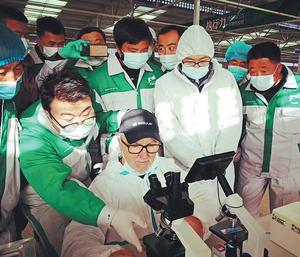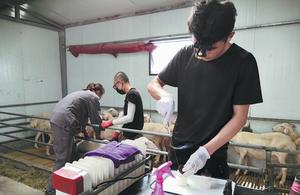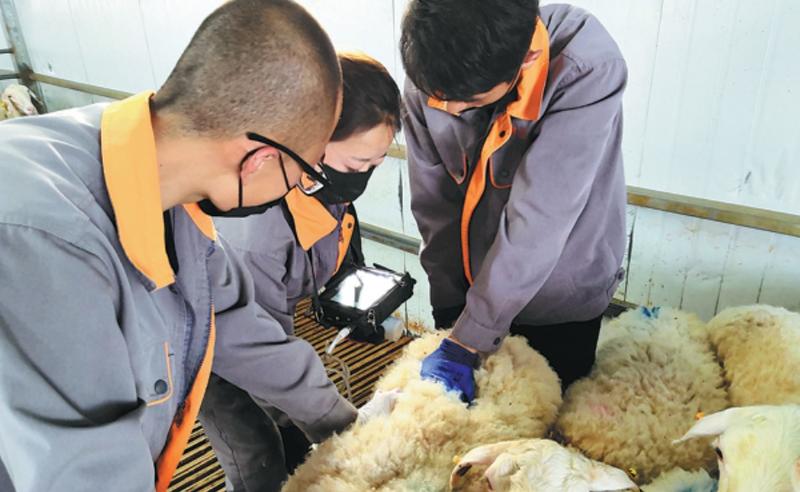An imaginative initiative is helping to raise incomes in Northwest China. Li Hongyang reports.
 David Osborn, a veterinarian from Australia, discusses the technology used for artificial insemination with workers in Huanxian county, Gansu province, last year. (PHOTO PROVIDED TO CHINA DAILY)
David Osborn, a veterinarian from Australia, discusses the technology used for artificial insemination with workers in Huanxian county, Gansu province, last year. (PHOTO PROVIDED TO CHINA DAILY)
"While I was eating dinner, the noise made by the sheep rang in my ears and the smell of dung lingered in my nose," Xu Xia said, recalling her early days as a shepherd.
The 25-year-old is one of hundreds of college graduates who had never actually touched a live sheep before starting work for a company that breeds the animals in Huanxian county in the northwestern province of Gansu.
Although I was born and raised in the county, where most people make a living from sheep farming, I had never dealt with livestock, so I was in trouble when I started out
Xu Xia, college graduate who works for a company that breeds sheep
"Although I was born and raised in the county, where most people make a living from sheep farming, I had never dealt with livestock, so I was in trouble when I started out," she said.
In recent years, college graduates have been playing a "bellwether", or leading, role in helping local shepherds breed and raise a type of high-yield sheep in the county.
The Hu breed, introduced nearly three years ago, requires less robust treatment and more scientific breeding techniques than goats, the animal traditionally raised in the county, if they are to survive and reproduce.
In the past, although they lived below the poverty line, few villagers were prepared to try breeding a type of sheep they knew nothing about and had little understanding of the optimum raising techniques.
Another cause of suspicion was that over the previous three decades the county government had urged farmers to raise new breeds, including black goats and small fat-tailed sheep, but the attempts had never been profitable. Therefore, in 2019, to encourage farmers to raise the more profitable Hu breed-which originates from the area around Taihu Lake, straddling the provinces of Zhejiang and Jiangsu-local businesses hired college graduates to become industry leaders.
The graduates were chosen to oversee the process because breeding Hu sheep requires greater awareness of technical expertise and the ability to absorb new ideas.
The businesses breed the sheep and ensure their survival before selling them to farmers.
 A breeder in Huanxian prepares to artificially inseminate a ewe. (PHOTO PROVIDED TO CHINA DAILY)
A breeder in Huanxian prepares to artificially inseminate a ewe. (PHOTO PROVIDED TO CHINA DAILY)
New experience
For the graduates, embarking on such a career has been an unusual, but rewarding experience.
In July 2019, Xu was assigned to her first job, overseeing a pen that contained 200 Hu sheep.
She recalled that the smell made her feel unwell in the early days. After a day of cutting grass, feeding the sheep and clearing away their dung, her white shoes were black and her head was spinning with issues related to the animals.
She had to patrol the pen at set hours overnight to see if any sheep had fallen sick.
At first, she was scared because the path from her dormitory to the pen was unlit, so to bolster her spirits she usually called her mother on video chat and spoke with her as she walked.
Sheep are timid around strangers and they bolted and even knocked Xu down every time she vaccinated them.
She was unfazed. "I did physical training every day when I studied at a police college and I am not afraid of hard work," she said.
In 2018, Xu took an exam to become a police officer after graduating from the Hunan Judicial Police Vocational College in Changsha, the provincial capital, but failed. She also failed when she retook the exam the following year.
Seeing that her dreams of joining the police were going nowhere, she began looking for other work.
"I needed a job so I did not have to ask my parents for money. I saw this one online and after choosing the career, I found it interesting," she said.
"I was pleased to see the number of sheep doubled thanks to my hard work. The animals became friendlier and cuter to me and I liked caring for them."
In April last year, the company transferred her to the human resources department on a monthly salary of about 3,000 yuan (US$457).
She plans to study for an HR qualification and further develop her career with the company.
"The local government provides a lot of policy and financial support for sheep farmers and poverty alleviation purposes, so the company has a promising future," she said.
 College-educated breeders in the county conduct ultrasound scans on pregnant ewes. (PHOTO PROVIDED TO CHINA DAILY)
College-educated breeders in the county conduct ultrasound scans on pregnant ewes. (PHOTO PROVIDED TO CHINA DAILY)
Poverty alleviation
Located on the Loess Plateau among the Liupan Mountains-an area that was once home to a large number of poverty-stricken families-Huanxian has an arid climate unsuited to the cultivation of crops and grasses. Moreover, the lack of a transportation infrastructure was once an obstacle to the expansion of the sheep industry.
To solve those problems, about 10 years ago the county government introduced high-yield sheep breeds and mechanized fodder planting, while laying sealed roads through the mountains.
Last year, the per capita income of the county's sheep farmers was 5,200 yuan, a rise from the 4,000 yuan recorded in 2019.
In February last year, the provincial government took Huanxian and 30 other counties off the list of poverty-stricken areas.
The move was in line with standards and regulations established by the central government.
"At first, the villagers were always worried about the survival rate of the Hu sheep. Any deaths added to their suspicions about the breed," said Wan Hao, a poverty alleviation official in the county's Heiquanhe village.
"Some villagers wouldn't even pay 100 yuan for a year's medical care for themselves. They said they didn't have any illnesses so they had no reason to prepare for unpredictable events in the future," he said.
In the same vein, they were unwilling to purchase health insurance for their livestock.
Wan arranged for those villagers who were most likely to adopt new ideas to visit sheep-breeding bases to learn about Hu sheep and study the advanced technology being used to raise them.
"Villagers tend to follow the advice of their peers, rather than officials like me," he said.
To further boost the locals' confidence in the sheep, the businesses only sell them pregnant ewes to ensure fertility.
The local government provides a subsidy of 800 yuan for each 2,400 yuan ewe.
The county government said that by the end of the year, it aims to have bred 3 million sheep, raising the annual per capita income of local farmers to 6,000 yuan.
Contact the writer at lihongyang@chinadaily.com.cn


